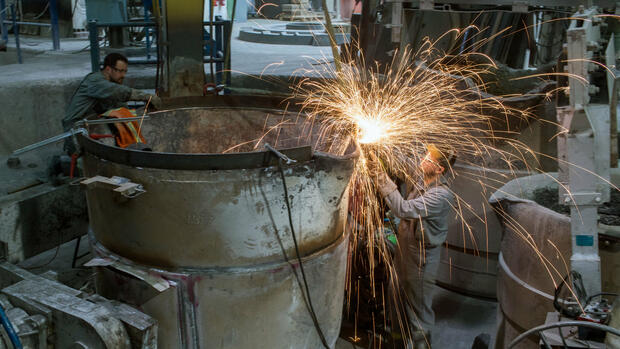The industry associations fear EU rules that are too strict for companies.
(Photo: dpa)
Berlin Small and medium-sized industrial companies are criticizing the EU Commission’s plans for a reform of the EU Industrial Emissions Directive. “With its project, the Commission is far removed from operational reality. It defines requirements that are technically almost impossible to meet,” says Elke Radtke from the Federal Association of the German Foundry Industry (BDG).
The association represents around 600 foundries in Germany with around 70,000 employees.
The core of the EU reform is about setting new emission limits, prescribing new environmental management systems and introducing mandatory transformation planning for every company. In addition, the requirements in the context of approval procedures are to be tightened.
In addition to the foundries, the reform of the directive affects large parts of the manufacturing industry, including companies in the chemical industry, metal processors and galvanizers. A total of 13,000 systems are affected in Germany. The European Parliament’s Environment Committee will vote on Thursday of this week, and the plenary vote is to follow on July 10.
From the point of view of the affected sectors, the planned new emission limit values can hardly be met. For example, a position paper by the hot-dip galvanizing industry association states that the currently applicable limit values have only just been redefined after a three-year revision process and reflect the state of the art in their entire range.
Production is already being relocated to Turkey
“The plant operators would be overwhelmed by this tightening, since it is impossible for the industry to always comply with the lowest limit value at all locations within the specified bandwidths. This would lead to clear locational disadvantages for companies in the EU and can promote relocation processes,” the paper continues.
>> Read also: According to Habeck, the industrial electricity price also helps medium-sized companies
Elke Radtke from the BDG also considers this scenario to be realistic: “We can already see today that production is being relocated to Turkey, where the official requirements are far less demanding than within the EU. In practice, this means that production often takes place under environmental and working conditions that we don’t think are acceptable,” she says. This shifting process will continue and accelerate if the reform becomes a reality.
“Our industry is characterized by medium-sized companies. Foundries with a few dozen employees die silently,” says Radtke. “We expect the federal government to work to stop this creeping deindustrialization.”
Environment Ministry defends the directive
From the point of view of the affected industries, the planned environmental management systems and the mandatory transformation plans could prove to be an additional burden. They point out that there are already functioning and widespread environmental management systems. Others are therefore superfluous.
With its project, the Commission is far removed from operational reality. It defines requirements that are technically almost impossible to meet. Elke Radtke, Federal Association of the German Foundry Industry
Instead, the companies are insisting on faster and less bureaucratic approval procedures in order to be able to cope with the upcoming transformation processes: “As an industrial location that has the highest standards at all levels in a global comparison, we don’t need any further tightening,” says Franz Ehl, board member of the hot-dip galvanizing industry association. The industry needs rather good framework conditions to meet the challenges of decarbonization.
The responsible Federal Ministry for the Environment does not share the criticism of the economy. “The future directive will offer planning and legal security for industrial companies in Europe through modern approval procedures and will ensure a high level of protection for the environment overall,” said a ministry spokesman. The directive supports the transformation towards a sustainable, clean, climate-neutral and circular economy.
This assessment is not shared unanimously in the traffic light coalition. Criticism comes in particular from the ranks of the FDP: “When revising the industrial emissions directive, we must not lose ourselves again in small-scale regulation with a view to the competitiveness of our economy,” said Lukas Köhler, Vice President of the FDP parliamentary group.
It is important that a sense of proportion is maintained and that the directive remains workable in practice. “We want to give the industry as much leeway as possible to comply with the limit values and consider additional requirements, such as the mandatory preparation of transformation plans for each individual plant, to be completely superfluous,” said Köhler.
The transformation of the economy towards climate neutrality is already taking place via the fixed CO2 cap in emissions trading, so no further regulation is required in this regard.
More: Think tank demands free market strategy for the transformation of the industry
